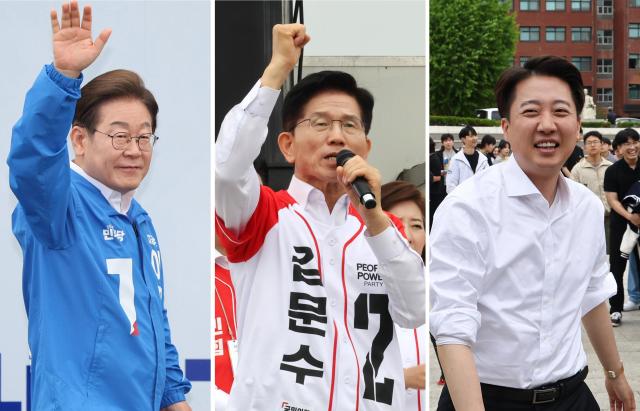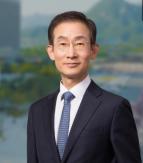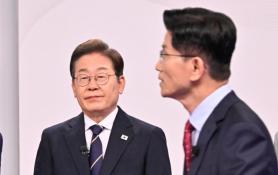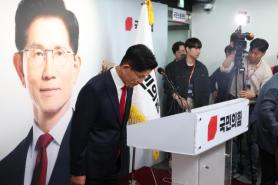
SEOUL, May 18 (AJP) - One week into South Korea’s snap presidential election, Democratic Party (DP) candidate Lee Jae-myung is beginning to break away from the pack, a survey showed Saturday.
Lee’s campaign, steady and cautious, is gaining traction even in regions once considered hostile ground. People Power Party (PPP) candidate Kim Moon-soo remains stalled in second place, while Reform Party candidate Lee Jun-seok stays in the single digits, aiming to position himself as a third option.
A poll released by Gallup Korea on May 17 shows Lee Jae-myung with 51 percent support nationwide, marking the first time he’s crossed the halfway mark. He holds strong numbers in the capital region, 50 percent in Seoul and 55 percent in Gyeonggi and Incheon, and is making surprising inroads in conservative strongholds, polling at 34 percent in Daegu City and North Gyeongsang Province and 41 percent in Busan City, Ulsan City, and South Gyeongsang Province. He also holds a solid majority among centrists, with 52 percent support.
Lee reportedly told aides to “keep their heads down” and stay humble, trying to keep his posture low even as his numbers climb. Within his camp, there’s growing awareness of a potential backlash or late conservative surge, particularly among so-called “shy” conservative voters.
Kim Moon-soo, who emerged as the PPP’s nominee after a drawn-out internal battle, is struggling to build momentum. He sits at 29 percent support, with 48 percent in Daegu and North Gyeongsang Province and 39 percent in South Geyongsang Province including Busan and Ulsan, numbers far below what the party had expected. His backing among conservatives (58 percent) also trails the 84 percent support Lee enjoys among progressives.
Kim’s early campaign has been marred by a string of challenges, including the delayed departure of former President Yoon Suk Yeol from the party and unease over the presence of hardline figures in his camp. While some in the PPP believe Yoon’s exit will help consolidate their fractured base, others argue it came too late to change the dynamic.
Meanwhile, Lee Jun-seok, polling at 8 percent, is pressing his case as the only real alternative to both Lee and Kim. He’s hoping to attract conservatives disenchanted with the PPP and moderates wary of Lee Jae-myung’s return to power. But with the election drawing closer, many voters are expected to return to the familiar camps of the two main parties.
Calls for a conservative unification have largely lost steam. Kim’s early plan to build a broad right-wing coalition collapsed when talks with former Prime Minister Han Duck-soo broke down. Now, with Lee Jae-myung pulling ahead, there appears to be little incentive left to pursue an alliance with Lee Jun-seok.
Lee is expected to sharpen his attacks on Kim, framing him as a "far-right insurrection candidate" for refusing to cut ties with Yoon Suk Yeol. Lee Jun-seok also criticized Kim, saying, "Any candidate with shared responsibility [for Yoon’s declaration of martial law] must step down with Yoon."
With just over two weeks to go, the race is entering a critical phase. Lee Jae-myung is focused on protecting his lead without overreaching. Kim Moon-soo is under pressure to find momentum. And Lee Jun-seok, despite low numbers, is holding his position in hopes of a late break.
The Korea Gallup poll cited in this article was conducted from May 13 to 15 among 1,004 respondents aged 18 or older. The survey has a margin of error of ±3.1 percentage points at a 95 percent confidence level and a response rate of 16.4 percent. For full details, refer to the National Election Survey Deliberation Commission.
Copyright ⓒ Aju Press All rights reserved.




